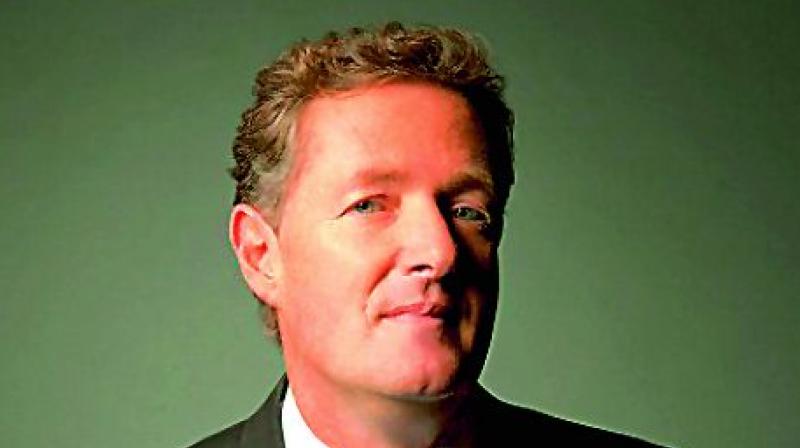Farrukh Dhondy | Chumocracy and the media: Web of friendships fuel UK power battles

“The most difficult thing
Which I can never get right,”
The Rocket Scientist said,
“Is ironing the sleeves of a linen shirt
After it’s been in the wash.”
From Great Expectorations, Tr. from the American by Bachchoo
The latest British venture of the Rupert Murdoch empire has been the establishment of a TV channel called TALK TV. I use the word “establishment” cautiously and ambivalently, because the channel has had a shaky and disappointing start.
For months, huge hoardings in Britain’s cities urged its population to tune in to the channel with benign pictures of the journalist, ex-editor of the News of the World and then of the Daily Mirror, presenter on TV programmes both in Britain and the United States, one Piers Morgan.
The caption on the posters said something like “love him or hate him -- just watch him on Talk TV….”
Very few did.
Morgan is famous for notorious encounters on TV. In one incident, he interviewed Donald Trump, who walked out of the interview when he didn’t appreciate the tack of the questioning. The satirical magazine Private Eye constantly refers to Morgan as Piers Moron, an epithet he doesn’t deserve as he is very smart if “egotistically challenged” -- my way of saying compromisedly vain.
Despite the featuring of Morgan as their star, Talk TV tanked -- which is the English idiomatic allegory for fish who die and plunge to the bottom of the waters. Its viewing figures could in no way justify the sum that Murdoch reputedly paid him.
Nevertheless, in Britain, whether or not it’s true, there is a prevalent opinion that the media, especially the popular newspapers and the BBC, are decisive factors in the formation of opinion and consequently influence democratic politics. When John Major’s Tory Party won the election in 1992, the Sun newspaper led with the headline “It’s The Sun Wot Won It!”
More recently, after the resounding defeat of Jeremy Corbyn’s Labour Party in the 2020 general election, the left-wing elements insisted that it was the media’s negative propaganda against Mr Corbyn and not the electorate’s evaluation of his policies which led to his party’s defeat.
The Tory Party constantly moans about the BBC having a left-wing bias in all its presentations and reports.
None of these contentions, as even Rupert Murdoch admitted after he reprimanded the Sun’s editor for the “Sun Wot Won It” headline, are verifiably true. And yet politicians persist in sucking up to the media.
The latest example of which is that Hedgie Sunak and Liz (Un)Truss(worthy) consented to have their second televised debate about their candidature for the PM of the UK on -- yes -- Talk TV. Now both of them have a battery of advisers who know that Talk TV is not a platform that will influence anyone, but they consented to go on it because they want to suck up to Rupert Murdoch so that his other media outlets will remain in thrall, or at least friendly, to them through this contest and through a general election when that comes.
In a paradoxical sense, the appearance on the very-sparsely-visited Talk TV turned out to be a success of sorts because the presenter, one Kate McCann, on hearing the opinions of Hedgie and Untruss, fainted on the set halfway through the debate, which was then curtailed. The two contenders rushed to sympathise and all the newspapers and the other TV channels, including the BBC, reported this incident. It might suggest to Piers Morgan that he should feint fainting on each of his shows to gain viewership and justify earning the extraordinary amount he is paid for them.
In very many countries in which the government comes in for criticism or censure from the media, these media outlets are proscribed, prosecuted, closed down and their journalists harassed, jailed and even killed. The UK dare not do any of these, though the proposals of the current culture secretary, one Nadine Dories (who is culturally challenged and wouldn’t know Mozart from Mozarella or George from T.S. …) to deny the license fee funding to the BBC and to privatise the radical Channel 4 are backdoors to a possibly milder censorship – it’s as far as this democracy will allow its government to go.
The private ownership of the press and the chumocracy between power and public exposure is manifest daily.
A few weeks ago, The Times ran a story saying that when BoJo was still foreign secretary he proposed a top government job for Carrie Symonds (now Mrs Johnson). The story ran for one edition in The Times but was then spiked. Carrie, now Mrs J, got her people to get the top brass of the Murdoch empire to tackle the editor Tony Gallagher and have the story removed. What that story contained was a reference to the fact that BoJo was having an affair when he proposed her for the job. She was desperate to get the story suppressed.
Why?
It now emerges that BoJo was caught by an intruding colleague on a sofa in his parliamentary office in the act of being given oral sex by his then girlfriend Carrie.
In my humble opinion, gentle reader, this censorship through a web of corrupt friendships may be reprehensible but it is certainly preferable -- more in keeping with the corrupt ways of modern democracy -- than threatening journalists critical of government with false charges, imprisonment and worse. Jai Hind!

